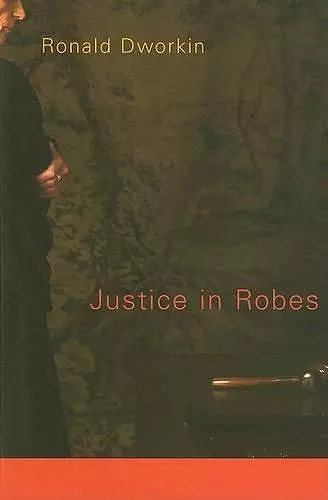Justice in Robes
Format:Paperback
Publisher:Harvard University Press
Published:30th May '08
Should be back in stock very soon

How should a judge’s moral convictions bear on his judgments about what the law is? Lawyers, sociologists, philosophers, politicians, and judges all have answers to that question: these range from “nothing” to “everything.” In Justice in Robes, Ronald Dworkin argues that the question is much more complex than it has often been taken to be and charts a variety of dimensions—semantic, jurisprudential, and doctrinal—in which law and morals are undoubtedly interwoven. He restates and summarizes his own widely discussed account of these connections, which emphasizes the sovereign importance of moral principle in legal and constitutional interpretation, and then reviews and criticizes the most influential rival theories to his own. He argues that pragmatism is empty as a theory of law, that value pluralism misunderstands the nature of moral concepts, that constitutional originalism reflects an impoverished view of the role of a constitution in a democratic society, and that contemporary legal positivism is based on a mistaken semantic theory and an erroneous account of the nature of authority. In the course of that critical study he discusses the work of many of the most influential lawyers and philosophers of the era, including Isaiah Berlin, Richard Posner, Cass Sunstein, Antonin Scalia, and Joseph Raz. Dworkin’s new collection of essays and original chapters is a model of lucid, logical, and impassioned reasoning that will advance the crucially important debate about the roles of justice in law.
Dworkin, a professor of law and philosophy at NYU Law School and University College, London, has for a generation been an influential voice in the rarefied debate that has raged in academia over how best to construct a logically consistent and philosophically useful description of what law is and what law should do. In addition, Dworkin has been a strong voice defending the jurisprudence that supports abortion rights, free speech and other liberal positions in more public debates. Consistent with both roles, these essays explicate Dworkin's notion that law must have a moral component, and deconstruct and criticize the ideas of competing theorists. Against some of them, like the prolific Richard Posner, he takes the gloves off. For example, Dworkin describes one aspect of Posner's jurisprudence as 'remarkably implausible,' strong words from a philosopher. Dworkin's debate with others is more measured, but he is willing to step into the ring with each and defend his ideas. This is a serious, difficult book that succeeds in explaining what Dworkin believes, what the other theorists argue, and why it matters who is right. * Publishers Weekly *
Ronald Dworkin, one of the nation's foremost legal philosophers, has solidified his legacy with his latest book. Justice in Robes presents a synthesis of Dworkin's jurisprudential theory… Most intriguingly, Justice in Robes includes several chapters challenging the leading proponents of competing jurisprudential theories. Accessible, provocative, and enlivened by frequent clash, [the book] offers an ideal primer for students beginning their study of jurisprudence, and the book also rewards close scrutiny by scholars who are already familiar with Dworkin's philosophy. -- Tom Liniger * Michigan Law Review *
For over three decades, Ronald Dworkin has been the most influential and illuminating analyst of the view that judges can or should merely 'follow the law.' -- Cass Sunstein * New Republic *
Dworkin's Justice in Robes is bound to interest and challenge any student of law, philosophy of law, and philosophy in general. While the essays most directly address the question 'What makes a proposition of law true or false?' they contain a more general analysis of influential philosophical doctrines such as pragmatism, positivism, and pluralism. The lessons of Justice in Robes, therefore, go beyond the field of philosophy of law and reach to the areas of metaphysics, philosophy or language, ethics, and politics. -- Tatiana Patrone * Metapsychology Online *
The underlying question is of the first importance—How do we reconcile the rule of law with judges' deployment of their own values and their own theories of the good society?—and on that there is enough here that is new and important to make the book well worth reading for anyone interested in the law… Justice in Robes does more to open up new options in our thinking about the rule of law than a whole library full of books by opinionated pragmatists or by the careful conceptual purveyors of a purely analytic jurisprudence. -- Jeremy Waldron * New York Review of Books *
Few philosophers or lawyers write with so easy and engaging a literary style as Dworkin, and the flow of his argument has striking persuasiveness… He has revolutionized the way many people think about law and related subjects… The power of his jurisprudence is enormous. -- Neil MacCormick * Times Literary Supplement *
ISBN: 9780674027275
Dimensions: unknown
Weight: unknown
320 pages